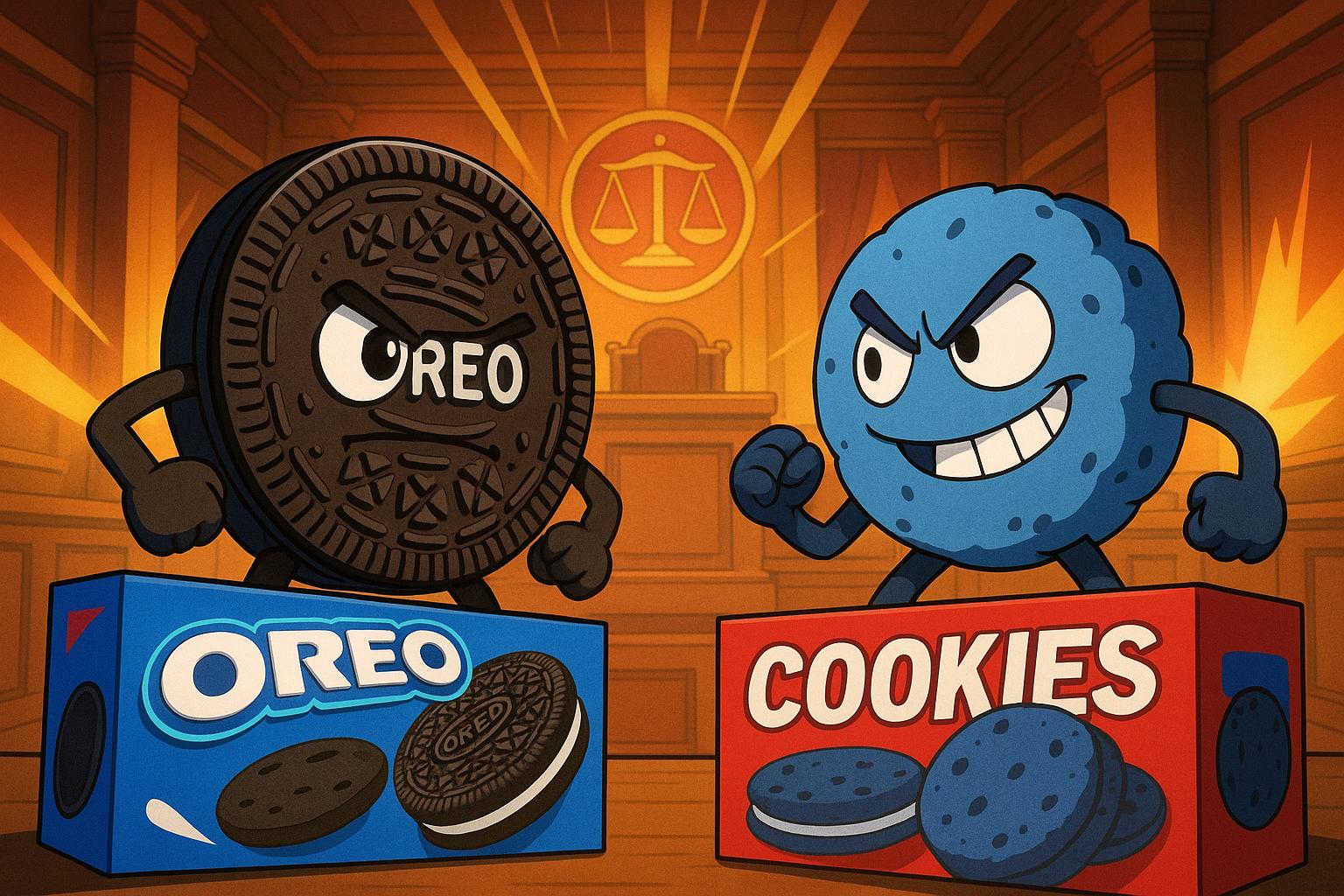Mondelez International has launched a federal lawsuit against Aldi, accusing the supermarket chain of imitating the packaging of its popular snack brands like Oreos and Chips Ahoy. This legal action highlights ongoing tensions over private-label design similarities as Aldi faces repeated claims of consumer confusion.
Snack food giant Mondelez International has initiated legal action against Aldi, asserting that the supermarket chain’s packaging for its private-label cookies and crackers closely imitates that of well-known Mondelez products, such as Oreos and Chips Ahoy. Filed in a federal court in Illinois, the lawsuit claims that Aldi’s packaging “blatantly copies” the visual identities of Mondelez’s lines, aiming to mislead consumers and potentially causing significant harm to the brand’s reputation and sales.
In the materials submitted to the court, Mondelez provided visual comparisons that highlight the similarities between the products. For instance, Aldi’s Thin Wheat crackers sport a gold box, resembling the familiar look of Mondelez’s Wheat Thins. Similarly, both Aldi’s chocolate sandwich cookies and Oreos are packaged in shades of blue, while the chain’s Golden Round crackers parallel the red packaging of Mondelez’s Ritz crackers. Mondelez argues that these likenesses are likely to deceive and confuse customers, blurring the lines between the two brands.
Aldi, which has garnered attention for its competitive pricing and rapid expansion—operating over 2,500 stores across 39 states—has previously faced legal scrutiny over packaging issues. Notably, in December 2024, an Australian court ruled against Aldi in a copyright infringement case concerning their Mamia brand’s similarity to the Baby Bellies snack line, highlighting a pattern of legal challenges concerning their product designs.
Building on this precedent, the recent allegations from Mondelez echo a case from October 2015, in which King’s Hawaiian sued Aldi over packaging similarities for sweet rolls, claiming it created confusion among consumers regarding the source of the products. Such claims have become a recurring theme in the dialogue surrounding Aldi’s strategies, raising concerns about the potential for consumer deception.
Moreover, Mondelez has indicated that it had previously contacted Aldi multiple times in an attempt to resolve the packaging discrepancies without resorting to legal action. The company noted that while Aldi did alter some of its packaging in response, it has continued to sell other similar products, prompting this lawsuit. With the stakes high, Mondelez is not only seeking monetary damages but also an injunction to prevent Aldi from further selling these allegedly infringing items.
Aldi’s U.S. operations are helmed by newly appointed CEO Atty McGrath, who is stepping into the role in the wake of these legal challenges. The company has not publicly commented on the lawsuit, which raises questions about its brand strategy and approach to private-label products.
As the legal battle unfolds, it is evident that the protection of intellectual property rights remains a contentious issue within the food industry. Similar cases have increasingly emerged, such as Lindt & Sprüngli’s recent success against Aldi in Switzerland regarding their Moser Roth chocolate balls, which were found to bear an inappropriate resemblance to Lindor products. This particular trend suggests a growing imperative for brands to safeguard their identities amid the fierce competition of private labels that characterises modern retail.
With Mondelez and Aldi now embroiled in a courtroom standoff, the outcome will likely have far-reaching implications not only for their respective brands but also for the standards of packaging and trademark integrity within the retail landscape.
Reference Map:
- Paragraph 1 – [1]
- Paragraph 2 – [1], [2], [6]
- Paragraph 3 – [3], [5]
- Paragraph 4 – [1], [4]
- Paragraph 5 – [1]
Source: Noah Wire Services
- https://theday.com/news/748980/oreo-maker-mondelez-sues-aldi-alleging-grocery-chain-copies-its-packaging-to-confuse-customers/ – Please view link – unable to able to access data
- https://www.theguardian.com/business/2024/dec/19/aldi-copyright-breach-baby-bellies-designs-australia-court-ntwnfb – In December 2024, the Federal Court of Australia found Aldi liable for copyright infringement over packaging designs for children’s snack foods. The court ruled that Aldi’s ‘Mamia’ brand packaging closely resembled that of rival brand Baby Bellies, constituting a ‘flagrant’ breach. Aldi had used Baby Bellies’ designs as a ‘benchmark’ for its own packaging, leading to the infringement. The court awarded damages and additional damages due to Aldi’s continued sale of the products after being notified of the infringement.
- https://www.gainesvilletimes.com/news/kings-hawaiian-sues-aldi-for-confusingly-similar-packaging-of-sweet-rolls/ – In October 2015, King’s Hawaiian filed a lawsuit against Aldi, alleging that Aldi’s sweet rolls packaging was ‘confusingly similar’ to its own distinctive packaging. The lawsuit claimed that Aldi’s packaging was likely to cause consumer confusion, deception, or mistake, leading consumers to believe there was a connection between King’s Hawaiian and Aldi. The case sought injunctive relief and damages for trade dress infringement.
- https://www.swissinfo.ch/eng/workplace-switzerland/lindt-wins-chocolate-ball-legal-case-against-aldi/88663737 – In December 2024, Lindt & Sprüngli won a legal case against Aldi Suisse for infringing the trademark rights of its Lindor chocolate balls. The Swiss court agreed that Aldi’s ‘Moser Roth’ chocolate balls were ‘unnecessarily similar’ to Lindor balls. Aldi was ordered to stop selling the infringing products, with a deadline set for March 13, 2025, to file a lawsuit in the main proceedings. The case highlights the importance of protecting intellectual property rights in the food industry.
- https://www.foodbusinessnews.net/articles/5159-king-s-hawaiian-sues-aldi-over-packaging-similarities – In October 2015, King’s Hawaiian Holding Company filed a lawsuit against Aldi, alleging trade dress infringement. The lawsuit claimed that Aldi was selling sweet rolls with packaging that was ‘confusingly similar’ to King’s Hawaiian Original Hawaiian Sweet Rolls. The conduct was likely to cause consumer confusion, leading them to believe there was a connection between King’s Hawaiian and Aldi. The lawsuit sought injunctive relief and damages.
- https://www.plagiarismtoday.com/2024/12/23/aldi-found-liable-for-infringing-competitors-packaging-copyright/ – In December 2024, Aldi was found liable for copyright infringement in Australia over packaging designs for children’s snack foods. The Federal Court ruled that Aldi’s ‘Mamia’ brand packaging closely resembled that of rival brand Baby Bellies, constituting a ‘flagrant’ breach. Aldi had used Baby Bellies’ designs as a ‘benchmark’ for its own packaging, leading to the infringement. The court awarded damages and additional damages due to Aldi’s continued sale of the products after being notified of the infringement.
- https://www.foodnavigator-usa.com/Article/2024/09/05/mondelez-lawsuit-and-authentic-sustainability-claims – In August 2024, Mondelez International faced a lawsuit alleging deceptive marketing practices related to its Cocoa Life program. The lawsuit claimed that Mondelez misled consumers by presenting its cocoa sourcing as sustainable and ethical, despite evidence of child labor and environmental degradation in cocoa farming. The case highlights the importance of transparency and authenticity in sustainability claims within the food industry.













